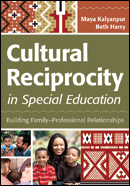

Vermont schools grapple with the residual impact of opiate abuse, by Tiffany Danitz Pache, 3-27-16

Find out in this Q&A with the authors of Cultural Reciprocity in Special Education: Building Family–Professional Relationships

About the authors
Dr. Kalyanpur has authored books and numerous articles on special education policy and families from culturally diverse backgrounds in the U.S. and India. Since 2006, she has been a consultant in Cambodia on projects relating to inclusive education. Currently, she is Inclusive Education Advisor to Cambodia's Ministry of Education under the Global Partnership for Education fund.
Beth Harry, Ph.D., is a professor of special education and chair of the Department of Teaching and Learning at the University of Miami's School of Education. A native of Jamaica, she received her bachelors and masters degrees from the University of Toronto and her Ph.D. from Syracuse University. Her teaching and research focus on issues related to the intersection of disability and diversity, with a particular concern for their impact on families.
Dr. Harry has published several books and articles on these topics and, in 2002, she served on the National Academy of Sciences panel on ethnic disproportionality in special education. Beth entered the field of special education as a parent of a child with cerebral palsy, an experience that she has chronicled in the memoir Melanie, Bird with a Broken Wing: A Mother's Story